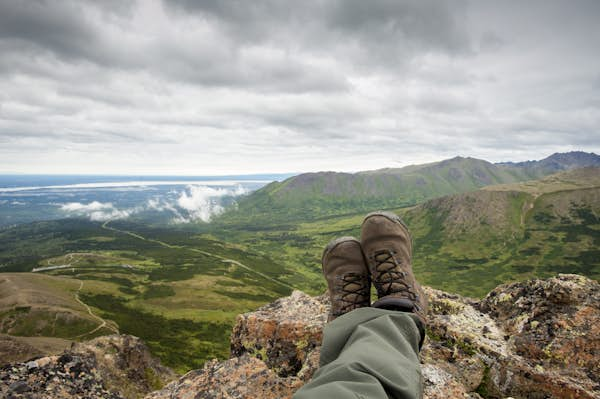Anchorage is a city literally surrounded on all sides by natural beauty. Before European settlers occupied the region, it was the homeland of the Dena’ina and the Native Village of Eklutna who hunted, gathered, and fished across the abundant land. Explore the bear- and moose-packed Chugach State Park or Cook Inlet – splashing with beluga whales in summer and fall – or hit either the north road or the south road out of town, each direction connecting Anchorage to mountainous destinations beyond. The magnitude of the surrounding nature can feel both magical and overwhelming in its vastness.
Accessible adventure awaits in Alaska’s largest city; the following are some of the top sites for outdoor experiences in and around Anchorage.

Chugach State Park
One of the largest state parks in the US, the Chugach (pronounced “choo-gatch”) forms Anchorage’s eastern border and rises above the city in a powerful display of geology. The park lets you access at least a dozen hiking trails easily by car. In fact, you can be looking for bears in the wilderness in the afternoon and sitting down to a 5-star meal in town later that evening.
The Chugach covers nearly 500,000 acres, but the area surrounding Anchorage is a great place to familiarize yourself with Alaska’s vastness. The Glen Alps Trailhead is the most popular in the city, and it’s where you can climb Flattop Mountain — also the most popular peak in town. It’s a short but steep hike with a scramble at the top, but at the unsurprisingly flat summit are 360-degree views of Anchorage, Cook Inlet, and all the vast wilderness beyond.
Other great hikes start here as well as from the Prospect Heights Trailhead nearby.
Tony Knowles Coastal Trail
Simply “The Coastal Trail” to locals, this paved path winds 13 miles from downtown Anchorage out to Kincaid Park. You can rent bikes year-round (with fat bikes a popular winter option) and pedal your way along the meandering, mostly-flat trail. It follows the curves of the coastline, and on a clear day, you can spot Denali in the distance across Cook Inlet, as well as a few (sometimes steaming) volcanoes. It’s one of the best areas in town to catch sight of a moose or three, especially in autumn.
A fun mission is to follow the Lightspeed Planet Walk, a scale solar system model that starts with the sun on the corner of 5th Ave and G St and stretches all the way to tiny Pluto out at Kincaid Park.

Chester Creek Trail
The Lanie Fleischer Chester Creek Trail is a greenbelt that meanders along a stream right in the heart of Anchorage. It connects with the Coastal Trail at Westchester Lagoon and then follows Chester Creek upstream 4 miles to Goose Lake, and it’s one of Anchorage’s favorite places for convenient recreation. In summer, cyclists, walkers, and joggers ply the path, and the trail is groomed for cross-country skiing in winter. The route is paved and flat, and it’s a lovely stretch of urban wilderness that offers stops at many parks along the way for a snack or a rest.
Anchorage Coastal Wildlife Refuge
While the Anchorage Coastal Wildlife Refuge stretches 16 miles long, most folks are familiar with the eye-shaped section named Potter Marsh. This roadside freshwater-and-brackish marsh lays on the southern outskirts of Anchorage along the Seward Highway. Birders flock to its accessible viewing platform, hoping to catch sight of swans, grebes, geese, or other migratory birds. Others wander along to look at the wildflowers, sweeping views of the mountains, Turnagain Arm, and the occasional moose or eagle.

Just south of Potter Marsh is the eastern end of the Turnagain Arm Trail, which starts at the Potter Creek Trailhead and runs 9.5 miles above and alongside the Arm. Although you can hear the Seward Highway below you, the trail is still wonderfully wild and scenic. In June or July, you might see beluga whales, and throughout summer, you can catch the mighty bore tide roaring in in one fell swoop. Dall sheep clamber along the rock faces above the trail, bald eagles sweep through the air, and moose and bear sightings are always possible.
Eagle River Nature Center
Set near the dramatic end of a gorgeous, steep valley with hiking trails scribbled all around it, the Eagle River Nature Center is a worthy 45-minute drive north of Anchorage. The town of Eagle River is a bedroom community of Anchorage, but once you drive through the suburban setting, the mountains begin to close in, and you can feel their magnificent power as you approach the Nature Center at the end of the road.
Inside the staffed Center are a few displays about the region, but the real excitement is outside. Guided naturalist walks, trails with viewing platforms and interpretive signs, and even overnight yurt and cabin rentals are all on offer. You can venture further into the mountains on the strenuous Crow Pass Trail, extending 23 miles to Girdwood.
Portage Valley
Lined with hanging glaciers and sliced lengthwise by the tumbling blue Portage Creek, Portage Valley sits about an hour’s drive south of Anchorage along the ridiculously scenic Seward Highway. Much adventure is packed into the 14-mile-long valley. You can walk or bike the mellow, family-friendly Trail of Blue Ice, which winds its way along the valley floor and has a gorgeous photo opportunity at every turn. A 3-mile round-trip hike takes you to the toe of Byron Glacier, where you may be lucky enough to see ice caves dripping with meltwater.

Portage Glacier, the namesake glacier that carved this valley, hides around a bend in the iceberg-packed Portage Lake. You can take a ride with Portage Glacier Cruises to see the face of the glacier and perhaps even catch it calving. The excellent Begich, Boggs Visitor Center includes a learning center and theater where you can gain an understanding of the geological history of the valley.
